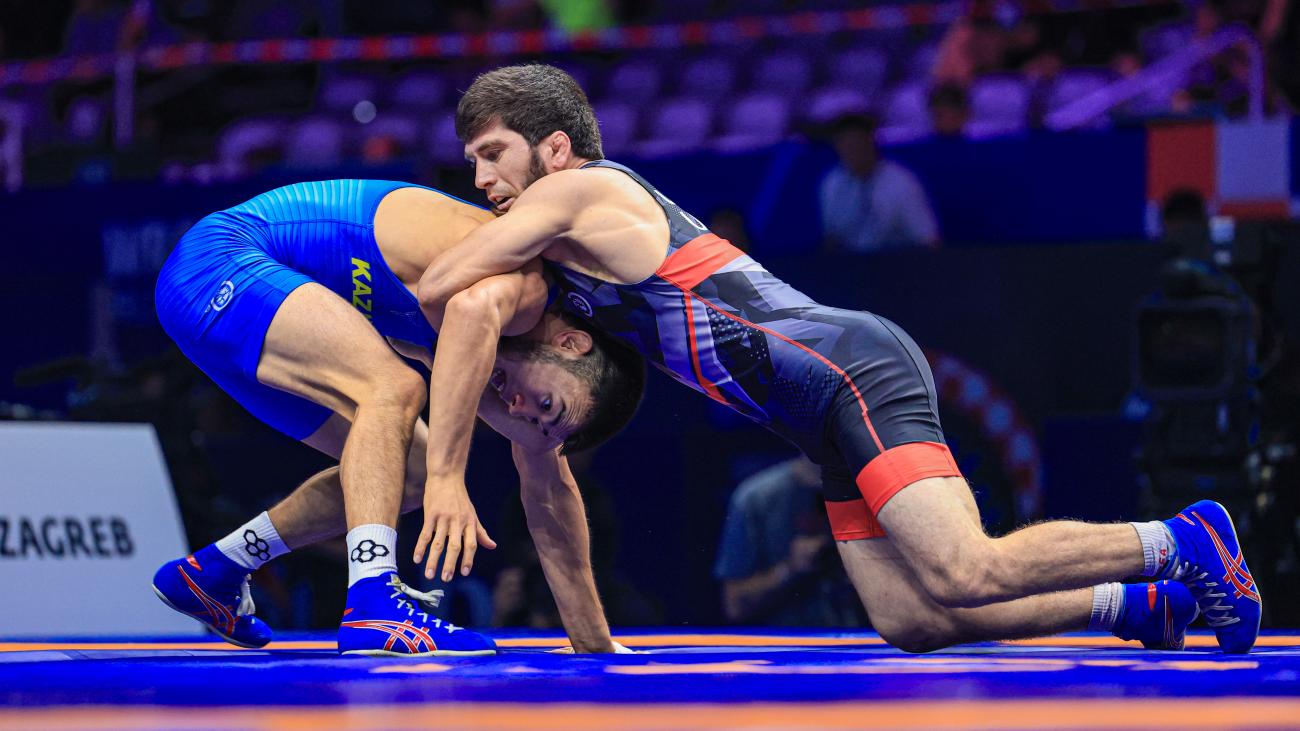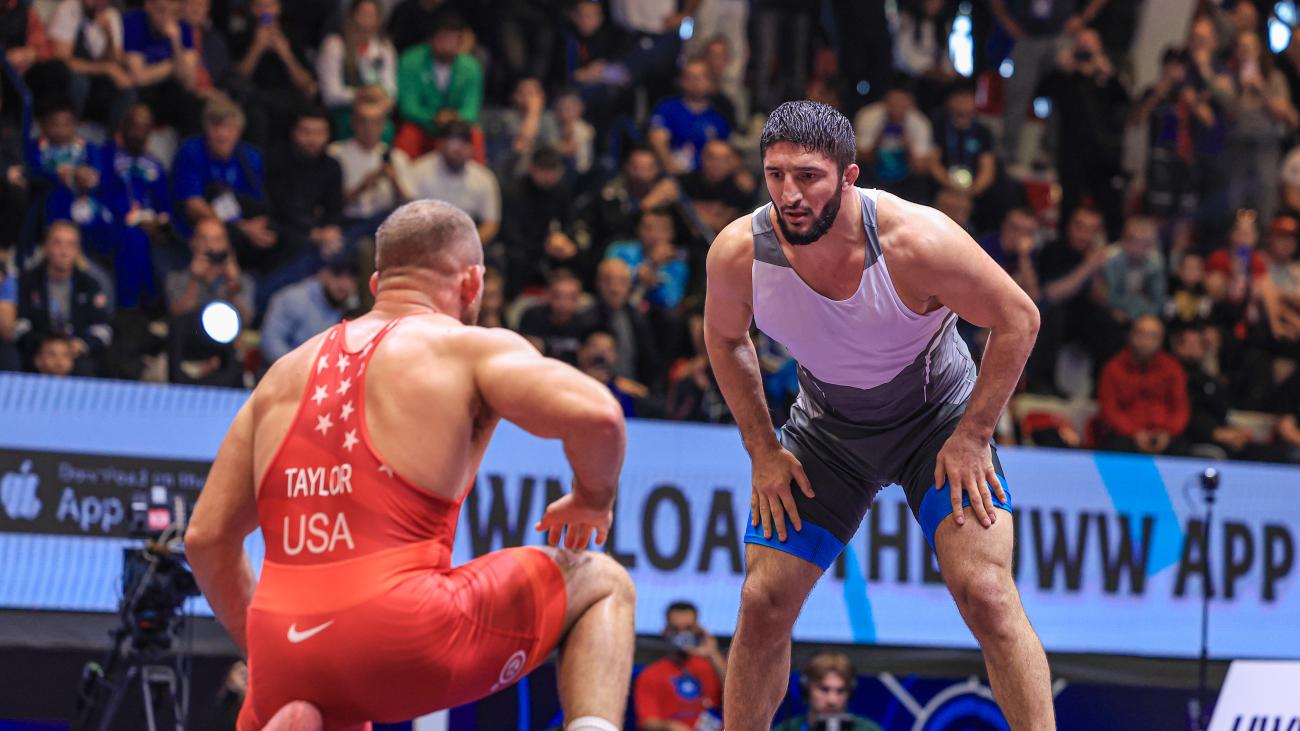FILA Champions: Dzhamal Otarsultanov
Country: Russia
Date of birth: 1987-04-14
Height: 166 cm
Weight: 61 kg
Place of birth: Solar, Republic of Dagestan, Russian Federation.
This past January, in the finals of the Ivan Yariguin Grand Prix, Dzhamal Otarsultanov taught Bekhan Goygereev an important lesson: just because you beat everyone else in the world doesn’t mean you’ll beat everyone in Russia.
At the 2013 Freestyle Wrestling World Championships in Budapest, Goygereev ran roughshod over his competition. The Russian looked better than his competition in the 66 kg weight class in every possible way; he was bigger, stronger and more technical. Reigning as world champion by a wide margin, Goygereev entered the 2014 Yaryguin Grand Prix where in the finals he met, and lost to, his countryman Otarsultanov by a 10-4 margin.
This was just another example of one great Russian wrestler defeating another. In the past Otarsultanov found himself on the losing end of similar exchanges. In fact, prior to winning the Olympic gold, the Chechan was never even the best Russian at his weight, and failed to earn a place on Russia’s national team for any Senior World Championships.
Though Otarsultanov had never represented Russia at world-level events when he did make the team and headed to London, he wasn’t unknown to the world. Before 2012, he had earned a more than one gold medal in a roll call of the toughest wrestling tournaments in the world. Three times he won the European Championship, and twice he won the Russian Championship, Yariguin Grand Prix, and the Junior World Championship. His decorations were such that even though he never competed on the world’s biggest stage, he arrived at the 2012 Olympics as one of the favorites, and coaches from other nations took notice.
Zeke Jones, the national coach of the United State Freestyle wrestling program, knew of Otarsultanov before the Games, and spent time closely watching video footage of his wrestling.
“He’s a good one to study,” said Coach Jones. “He has slick technique and understands tactics that win at the highest level.”
Indeed, Otarsultanov had shown the ability to beat the highest level competition for a long time before 2012. Though the reigning European Champion and Junior World Champion, he could not beat out North Ossetian superstar Besik Kudukhov to make the 2008 Olympic team at 55 kg. Otarsultanov could do nothing but watch as the United States’ Henry Cejudo won the 55 kg gold medal in the Beijing Games.
Two years prior, Otarsultanov dominated Cejudo in the finals of the Junior World Championships, outscoring his opponent by a lopsided point total of 14-5.
Thus, by the age of 22, Otarsultanov showed he could beat the best in the world, but he continued to find difficulty in earning the top spot on Russia’s national depth chart. In 2009, 2010 and 2011, Viktor Lebedev beat out Otarsultanov for the right to represent Russia at the World Championships, where he bronze, gold and gold, respectively. Russia’s unmatched ability to develop wrestling talent had left Otarsultanov locked out of a chance at the sport’s top prizes. All hope was not lost, however, for if the Chechen won the 2012 Russian National Championship, he could punch his ticket to London.
The wrestling world paid rapt attention to the 2012 Russian Nationals. Competition at 55 kg was particularly fierce, and if Otarsultanov claimed the championship, he would announce his status as a true threat for an Olympic gold medal. From the other side of the world, American coach Jones kept an eye on Otarsultanov’s progress at the Russian Championship.
“At first he was battling to make the team.” Jones remarked. “He had to get past Lebedev plus beat some of the best in the world.”
Finally, Otarsultanov would have the needed success against domestic competition, with a berth on Team Russia resting on the line. One adversary after another fell to Otarsultanov until only old rival Lebedev stood between him and a spot on the Olympic team. On the strength of a clutch second period push out, he defeated Lebdev in the finals, winning his national championship, and what turned out to be the de facto Olympic gold medal match.
Once in London, Otarsultanov never yielded a period to any opponent, and in four matches outscored his competition 27-7. Once Otarsultanov, who grew up in the tiny Dagestani town of Solar, made the Russian Olympic team, his sternest tests were behind him. In Otarsultanov’s case, compared to winning a Russian Championship, taking Olympic gold proved fairly easy.
Now the newly minted gold medalist must face the pressures of repeating his performance. Once a Russian wrestler like 26-year-old Otarsultanov, wins an Olympic gold at a young age, he no longer must only compete with his peers, as he will always compete with the greats who came before him. No country claims a pantheon of wrestling greats quite like the former Soviet Union, and much work remains for Otarsultanov if he wants to stand among them. Watching from the USA, Coach Jones understands the young wrestler’s place in Russian wrestling history.
“Obviously he’s proven himself and looked great in London,” Jones observed. “ He followed it up with a good win in Krasnoyarsk in the finals this year, but definitely has a ways to go to make a dent in Russia’s all-time best of Fadzaev, Khadartzev, Belaglozov, Pinigan, Medved, Yariguin, and others.”
In his pursuit to place himself alongside the greatest Russians to ever wrestle, including three-time Olympic champion and fellow Chechen Bouvaisar Saitiev, Otarsultanov must make a choice. At his new weight class of 61 kg, a non-Olympic division he can continue to face off against Goygereev, or he can move down to the Olympic weight of 57 kg, where Lebedev still lurks, no doubt hungry for a taste of revenge.
No matter what Otarsultanov chooses, when the Russian freestyle wrestling team attends the next three world championships and 2016 Olympics, it will do what it always does, and leave at least one of the world’s proven best at home.





